#and the very big problem at the source that is being stripped of autonomy
Text
Just saw a post that talked about the fact yes disabled people know their limits but it's more complex than that.
And it was about disabled people's agency being stripped away from us. How sometimes we can do thing but they won't let us. Because we're disabled.
And I wanted to comment about another thing on 'disabled people know their limits' but I didn't want to distract from this conversation so making a post instead.
Disabled people know their limits. Except when we don't.
I know it's difficult to say and to hear because it feels like it's the perfect admittance for ableists to strip us of the little autonomy we have.
But I'm disabled and I don't know my limits. But the thing is, other people don't know them either so don't dare them trying to tell me they know better.
Yes this is about late-diagnosed autism but I believe it can be the same for many other disabilities too.
Because I've been taught all my life I'm not disabled actually. So there is no reason I should not be able to do something that other people can do. That I should be able to be the same way.
It's about the constant exhaustion trying to live the way everyone lives and crashing ugly where everyone can't see it because it's too much. But it's about doing that all my life. And knowing only this way of living.
And now that I actually have recognition as a disabled person. Now that I can get accommodations and I'm not expected to do everything everyone does and the same way. I don't know where to start. I don't know what to ask for. And I keep doing the same.
Oh don't get me wrong there are the obvious things. I can wear ear protection now. But what about all the rest? I'm so exhausted constantly, how do I know where it comes from now? It's my whole life.
I finally started having a therapist who can help me with that. Learning my limits first. Learning to get them respected second. But it's taking a lot of time. And I'm still clueless about so many things.
And I'm so damn exhausted.
Disabled people know their limits. Except when we don't.
#i'm aware this concerns the 'not disabled enough to be stripped of autonomy community'#that our curse is not to lode agency but to struggle without help on end#and I'm very aware it needs to be told and told again#that we are the first to know our needs#not someone else#except in the case of high support autistics#and intellectually disabled people who really rely on their carer#and probably many other#which is another flavour on the 'sometimes we don't know'#anyway what I mean is that I know perfectly why we say thzt disabled people know their limits#and why it's important to say it#and the very big problem at the source that is being stripped of autonomy#and i'm not trying to counteract this very necessary activism#i just wanted to share my experience too#which is another kind of struggle#and does not fit into that#actually disabled#actually autistic#disability#autism
8 notes
·
View notes
Text
I am once again thinking about just how fucked up Kaiba is.
He talks a lot about how he dismantled Kaiba Corp as part of the military industrial complex and turned it into a game company, and that everything he's done has been to spite his step-father's memory, and yet...
He's still after power. A sense of security. His favourite game isn't about having fun anymore, it's about power. Even in a low stakes duel with Joey, he can't surrender that need for security. Out of context, it seems kind of silly, to view card games as this ultimate expression of power, but it actually makes a lot of sense.
The cards that Mokuba sneaks to Kaiba when they're young, particularly the handmade Blue Eyes card, played a big part in solidifying his determination to succeed at all costs. Those cards became a lifeline to him, and they became a way to visualise power when plotting his coup. They come to represent power, and his path to it.
And when Kaiba Corp became a game company, that card game actually did become a huge source of financial power and influence. As a child with a lot of issues regarding security (among other things) due to his being an orphan and Gozaburo's abuse, that power became his security. It's a source of stability and control, things he's not had since his parents died, it gives him an autonomy he's never had, and he's unwilling to part with any of it.
Being the best duelist is both a mark of pride and a symbol of his ultimate control. It proves that his sense of strategy and cunning and intelligence can't be beaten, that he can't be strong armed into defeat. Every game is a battle for power, and he can't stand to lose even a little of it, because if he does, it threatens him with losing control. And he can't abide by that. He won't be left helpless at the hands of others ever again.
It's why he can't stand the fact that he lost in his own tournament; it's the loss of control. He was going to secure his place and ensure that no one could ever beat him again, providing him with the only security blanket that matters, only to lose it again. Add in Yami and Yugi going on about fate and destiny - things that strip away control and autonomy - and of course he's going to react negatively. He doesn't want to feel helpless. He doesn't want his life to be in the hands of anyone but himself. He needs control, or he'll suffer again.
But the problem isn't that Kaiba is a fucked up child looking for security in his favourite card game. It's that he's a fucked up child with a multi-million dollar company that has very real influence over the lives of countless people, and we see multiple times that he's not willing to expend anything that doesn't benefit him personally. When Bakura ends up in a coma, he won't pause the finals to let him be taken to a hospital. When Joey is literally on the brink of death, Mokuba has to go behind his back to call for a rescue helicopter and explicitly tells the gang not to tell him. Multiple people are being hospitalised because of this one guy and Kaiba refuses to remove him from the tournament because if he does, he misses out on the chance to take his Egyptian God Card, aka a new layer to his security blanket.
He has very real tangible power, and he only extends it to his own benefit. He thinks that defanging Kaiba Corp was enough to make him different from Gozaburo, but it wasn't. He's just as ruthless, just as power-hungry, and just as indifferent to other people's suffering when it suits him. He has to be argued with, or choices have to be made without his knowledge.
And it's just... fucking sad. He has so little self-awareness about what he's become and what Gozaburo has made of him. He's become the very monster he despised, and his only saving grace is that he has people who give enough of a shit to argue back instead of deferring to him as yes men.
If Yugi hadn't confronted him in episode 1, and if Yami hadn't crushed the evil in his heart, then he would never have changed from his absolute worst self. And while Mokuba doesn't often stand up to him, when he does, Kaiba tends to listen. It might shock him - that's a different can of worms - but his decision will be swayed by Mokuba, which is no small feat.
The fact that there are people who will tell him no and stand up to him is the fine line between him and Gozaburo. The question is... does it make enough of a difference to really matter in the end?
#nightingale rambles#yugioh#ygo rewatch#seto kaiba#mind you im talking strictly about the dub version because thats what im watching#but there is so much trauma in this kid and giving him the keys to a multi-million dollar company has made him so much worse
31 notes
·
View notes
Text
Sci-fi woes.
Some of you won’t actually survive an era with incredible availability of mineral and material wealth, because you’re too jealous.
Space is full of two things: Absolutely ridiculous mineral wealth, for everybody currently alive now, and.. personal space. Meaning, someone with the right ship with its belongings on its back, to colonize worlds or just absorb local dust, debris and minerals and refine/manufacture them on site, could make for themselves a Star Destroyer sized personal home.
And that just be ‘normal sized’. Something with nuclear power, be it fission or fusion.
But some of you are just so god damned jealous at the idea anybody that goes through the trouble to acquire stuff for themselves has anything you don’t have rubberbanded to you through some manner of societal/government taxation, you’d just as soon it be illegal to possess anything unless you or at least your government gets a cut, or the owner has to pay a certain % of the worth of the value of their property in order to keep it.
In an infinite universe, you still wouldn’t see fit to just fucking leave people alone. Even when room for housing exists everywhere because there’s no specific best location vs. another. Even when we’re doing the space equivalent of living in mobile homes, if someone is living in a deluxe or luxury accommodation they either build themselves or buy, you’d still insist they pay the state money just to be allowed to live in such a big home.
And the very concept pisses me off, enormously. It slightly makes sense on earth because we live on top of a geographic sphere with gravity limited access to resources like water and metals and places to mine them and limited source of refinement for them. But fucking living in SPACE negates these issues. You can even fucking MOVE from where you’re stationed and just be somewhere else.
But some dude living in the equivalent of a trailer able to grow their own food either from sun facing windows or grow lights fed by their ship’s fuel source, with the supplies to last them for centuries or millenia, is somehow such a threat because of the accumulation of wealth that if they belong to a society, it must be forcibly redistributed or they need to decline membership to that society and risk getting marked by pirates.
There’s no real escape from tyrannical parasites, even in space.
Adding to this:
I disagree vehemently that, “individuals should not be more powerful than governments.” That’s bullshit. Bullshit. Individuals SHOULD be more powerful than governments; because an individual from a civilization and society that can fare space and is permitted the personal liberty to acquire the resources for themself is proving that personal liberty and autonomy is better than shitty governments that do nothing but stymie large populations for the sake of the All.
If YOUR shitty civilization can’t even get its shit together to sustain space flight and colonization, but [random numbers here] Musk has his shit together enough to strip down an asteroid the size of the moon for its material wealth, sells it to the local U.S. space refinery and pockets the rest? How should that be the individual’s problem?
We tolerate real estate tax down here because of the finite space to build homes. And that is a legitimate concern because you need space to house people. When housing and space are at a premium, it costs more for the individual person. But an era when personal ships should be common, that concern should be nill. There shouldn’t BE property tax unless you’re petitioning the government to recognize your claim. Unless you’re intruding on traffic space to and from places further out.
It absolutely should not be a government’s business if a private citizen has the personal firepower to kick over entire foreign militaries. Reason being, those governments can still argue amongst themselves in the event of a conflict whether the private individual is in the right to defend themselves, or was imposing their will on the military.
Nothing is automatically more valid or right just because a large group of people make a decision for another person. Unless you’re willing to agree with the horrible prospect that rape can somehow be democratically decided to be okay, no group of people has the right to dictate where another individual is, simply because of the threat of violence and superior numbers, on land and space they do not own. A sufficiently armed individual capable of pushing around antagonistic governments is good, ACKSHULLY.
Governments can be corrupt and make shitty decisions that affect, help or inhibit, millions, hundreds of millions, billions of people. Governments can be big or small. There is absolutely no reason why a government should get right-of-way over an individual when it comes to property rights simply because of monopoly of force. And that ultimately just appears to be what property tax is meant to stymie. Domestic accumulation of resources and product from people whom may get the bright idea to secede and take their property with them, and no longer pay revenue or materials or labor. And laws that prevent the anteing up serve only to secure that government’s monopoly of force by magnitude and numbers over an individual.
In short, if China repeats that merchant military vessel shit in space, bullying fishermen vessels, there’s no reason why a private citizen shouldn’t have the right to turn their whole fleet into hulks and ghost ships if they possess the force to do so. Just because a government’s standard issue weapon and armor may be inferior to what is scientifically possible for the premium a private citizen is willing to pay, or create, doesn’t mean a civilian should be automatically beneath another nation’s military’s might. And smaller countries should fucking do to remember that.
All the rest of the universe and all the planets and stars around us, and we have people that still would be upset if you had a pinch of dust they didn’t get a fraction of the spoils on. Ain’t that a B...
4 notes
·
View notes
Link
ON 15 February, the Cabinet of Japan approved a bill that officially recognises the Ainu as Indigenous people of northern Japan, many of which live in Hokkaido. Although Japan formally recognised the Ainu as an Indigenous group in 2008, concrete legal recognition has not been established until now.
The new ‘Bill on the implementation of the policies to realise a society where the pride of Ainu people are respected’ consists of 45 clauses and nine supplementary clauses. The first clause states that the Ainu are the Indigenous people of northern Japan and defines the nature of the bill; the fourth bans discrimination against them.
It even simplifies the procedures individuals must follow to obtain permission to collect timber from national forests for indigenous rituals and to catch salmon in rivers using traditional methods. Moreover, it defines the purpose and structure of the Symbolic Spaces for Ethnic Harmony – a national centre for promoting Ainu history and culture set to open in Shiraoi, Hokkaido, in April 2020. The national government will also be committed to subsidising similar local government projects.

Shiraoi Ainu Museum, Source: PixHound/Shutterstock
The bill, however, ultimately shies away from the genuine protection of Indigenous rights. It fails to directly address welfare policies, including life protection insurance, employment support schemes, and existing gaps in education levels. Furthermore, the bill does not acknowledge the immorality of past assimilation policies that have resulted in immeasurable losses for Ainu populations.
Merely defining a series of administrative procedures, the bill is limited to mandating the national and local governments to actively help preserve Ainu culture and improve the rest of the population’s understanding of it as well as of its people.
As such, it is not very difficult to identify the shortcomings of this so-called reform and condemn the government for its half-hearted approach to Indigenous issues.
Indeed, some activists and specialists have been quick to attack it. Some have argued that Japan’s Indigenous policies do not recognise Ainu self-determination and autonomy, disqualifying the country from meeting international human rights standards despite its government voting in favour of the United Nations Declaration on the Rights of Indigenous Peoples in 2007.
Nevertheless, it is too early to determine whether the new bill will prove useless or whether it will eventually benefit the Ainu people.
The new bill replaces the 1997 Ainu Culture Promotion Act (ACPA) that had also initially been largely criticised by Ainu activists and experts for explicitly rejecting the general concept of ‘Indigenous rights’. Some argued that the ACPA would not change anything and would fail to improve the socioeconomic status of the Ainu people.
However, the enactment of the ACPA actually encouraged – at least to an extent – individuals from the Ainu community to engage more in promoting their own culture. The Foundation for Ainu Culture, established under the ACPA, has hosted annual craft exhibitions and festivals across Japan that have arguably contributed to raising national awareness. Things seem to have changed, if even slightly, for the better over the past two decades with ACPA in place.
Additionally, in the past, government funding for cultural initiatives was only available on a case-by-case basis. The town of Biratori in Hokkaido, for example, where the famous Ainu village Nibutani is located, has long received financial assistance from the national government to temporarily employ workers in the development of Ainu cultural projects. The majority of project employees from the town have been of Ainu ethnicity.

Traditional Ainu dishes in Otaru museum. Hokkaido. Japan. Source: ArtNat/Shutterstock
Now, other local municipalities can facilitate similar programs under the new bill as well. That is, local governments can propose or plan an Ainu cultural promotion project and receive subsidies from the national government to create local employment, contributing to social and economic prosperity in the area.
Local Ainu populations naturally possess the required skills to work on these projects, meaning that the hiring process is based on merit rather than ethnicity.
In this way, the new bill can indirectly contribute to easing employment problems faced by the Ainu and to enhancing the socioeconomic status of Ainu communities in the region. Without compromising their identity, the Ainu are more easily able to live amongst other ethnic groups as ‘normal’ citizens of Japan.
While it is true that Japan’s law does not properly define who the Ainu are – only implying equality and rejecting collective Indigenous rights – this also means that regions with big Ainu communities are able to take advantage of the general lack of legal constraints. This results in there being less conflict with existing laws, and allows for greater social and economic prosperity that benefits the entire region instead of just the local Ainu populations.
Like ACPA, this new bill may well change social and economic conditions surrounding the Ainu in the long-term. From here, however, its success depends entirely on the tactics and initiatives local governments and individuals decide to implement.
Naohiro Nakamura is a senior lecturer in the School of Geography, Earth Science and Environment, The University of the South Pacific, Fiji.
This piece was first published at Policy Forum, Asia and the Pacific’s platform for public policy analysis and opinion.
Anyone in Japan with a greater understanding of the situation there (as well as less ambiguous translations) can tell me if I’m wrong, but it sounds to me that one of the details of this new Ainu bill scheme is to allow non-Ainu to request government funding as long as their projects are Ainu themed enough (like a souvenir shop, perhaps?)
This particular article seems optimistic that somehow Ainu’s “natural” predisposition to certain skills would certainly guarantee their position at the front of hiring considerations, despite the bill stripping them of legally requiring Ainu folks involvement in Ainu cultural projects.
On the other hand, it may offer Ainu folks who aren’t on the Japanese government’s registry (most Ainu are not registered) to benefit from financial assistance as well, at least in northern Japan. I’d be interested to know if that includes northern Honshu, or just Hokkaido. One issue that is consistently raised is how Ainu identity in the eyes of the occupying Japanese government is essentially region-locked. Hokkaido is a reservation in everything but name.
So far everything I’ve read continues to illustrate the shallowness of the 2019 Ainu bill, and the naked avarice that motivates it.
116 notes
·
View notes
Text
Glen Coco’s Top 10 Films of 2017

Unlike last year, 2017 was a stand-out for the film industry. There wasn’t an abundance of undisputed masterpieces per se, but there were still more than enough excellent motion pictures that deserve recognition. As always, it killed me having to omit so many great films, but that’s just life I guess. You got your ups and you got your downs. Anyway, here are my picks for the ten greatest films of 2017. But first, I’ll list the runners-up and the traditional bonus track. There’s always a bonus track.
Runners-Up
-Blade Runner 2049 ***
-Get Out
-Kong: Skull Island
-Last Flag Flying
-Molly’s Game
-Phantom Thread
-T2: Trainspotting
-Thor: Ragnarok
***Blade Runner 2049 probably would make this list in another life. The thing is, when I saw it, I was very tired and frustrated and I found it hard to focus. Because of this, I missed some important plot details, so the whole time my brain was trying to catch up with the narrative. It never did and I was lost. This is a gorgeous-looking film with excellent performances, direction, cinematography, visual effects and production design. But, I can not, in good conscience, include it without a second viewing. I’m a fucking nerd.
And here are the top 10!
#10b. (Bonus Track) The Lost City of Z
Director: James Gray
Starring: Charlie Hunnam, Robert Pattinson, Sienna Miller, Tom Holland
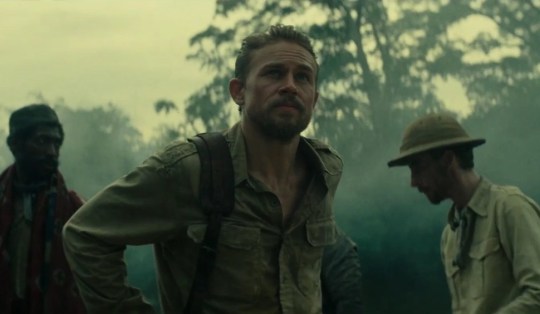
For a movie with a dashing lead who takes multiple expeditions into the Amazon rainforest to find a fabled lost city while facing perilous conditions from treacherous landscapes to hostile natives, The Lost City of Z has been seen by a total of zero people. That’s a shame. This is a movie that reminds us of pulp magazines and classic exploration films of old, promising mystery, intrigue and adventure. The film takes place over several years in the early 1900s and follows Percy Fawcett whose interest in a lost city turns into an obsession and whose multiple trips to find what may not exist threatens his family life and reputation. Directed by James Gray, The Lost City of Z is a refreshing antidote to the modern action film full of CGI and empty noise. The rich cinematography provides a natural and vivid look which amplifies the sense of danger Fawcett and his men must face. And Charlie Hunnam shines as Fawcett, pulling us into his world with his passion and charisma and even when disillusionment threatens these qualities, we remain invested in his struggle to the end.
#10. Mother!
Director: Darren Aronofsky
Starring: Jennifer Lawrence, Javier Bardem, Ed Harris, Michelle Pfeiffer
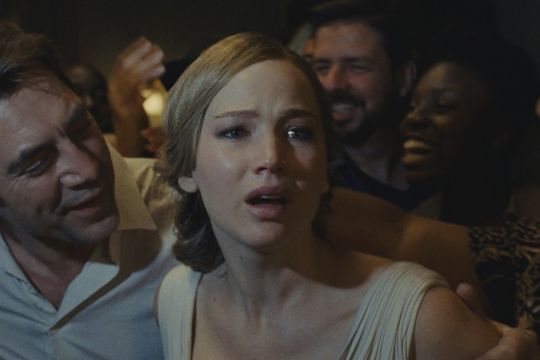
Mother! is undeniably polarizing and that’s understandable. Darren Aronofsky’s films aren’t meant for a mass audience and his use of surrealism can be frustrating at times, but it can also be deeply profound and Aronofsky is nothing if not ambitious. Mother! is perhaps his most challenging film but also one of his most mesmerizing. It starts out relatively calm as we see Mother (Jennifer Lawrence) living with Him (Javier Bardem) in a large country home in what seems like a tranquil existence, albeit with eerie undertones. Things get weird when unexpected guests arrive, played by Ed Harris and a deliciously chilly Michelle Pfeiffer. You think you’re in for a standard thriller until Aronofsky takes us down a wildly unexpected path. Never has a movie escalated so quickly and severely. Toward the end, it becomes a beautifully chaotic mixture of bizarre images and themes that blur the lines between reality and fantasy while grappling with topics from religion and death to the burdens of celebrity and motherhood. It’s a tumultuous journey, but if you suspend your disbelief and accept the mayhem, it’s like nothing you’ve ever experienced.
#9. The Florida Project
Director: Sean Baker
Starring: Brooklynn Prince, Bria Vinaite, Willem Dafoe
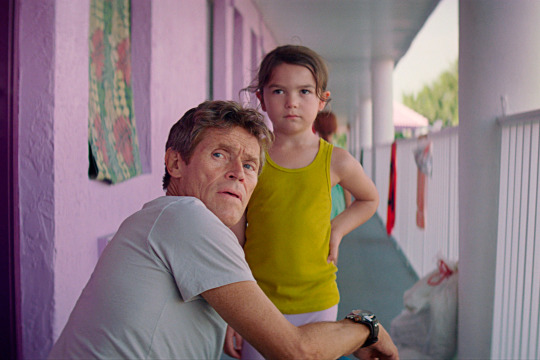
Rarely do movies focus their attention on the poor, uneducated and unfortunate souls we’re introduced to in The Florida Project. But writer/director Sean Baker has decided to observe the beauty and excitement in their lives. Brooklyn Prince, in one of the most impressive performances by any child actor, plays Moonee, who, along with her friends, makes the row of motels that line a street in Kissimmee, Florida her playground. It’s fascinating watching what these children get up to, from the innocent to the questionable to the downright illegal. But, Baker never judges; he merely observes the products of a sad reality. He highlights the joy in their lives while never ignoring their present struggles and the troubling future they probably have in store. Bria Vinaite gives an impeccably raw performance as Moonee’s mother, Halley, who drinks, does drugs, recruits Moonee to resell perfume to tourists and is no more mature than her six-year-old daughter. Willem Dafoe is the manager of the motel in which they reside who’s constantly solving everyone’s problems while unconsciously acting as a father figure at times without being unrealistically portrayed as a saint. Dafoe’s great here. But, it’s Moonee who shines at the end in one of the most emotional and heartbreaking scenes of 2017. Sadly, Moonee may not be destined for greatness, but Prince sure is.
#8. Dunkirk
Director: Christopher Nolan
Starring: Fionn Whitehead, Mark Rylance, Kenneth Branagh

Christopher Nolan is a master of creating spectacles that are as thought-provoking as they are thrilling and Dunkirk is no exception. With the help of Hans Zimmer’s relentless score and many turbulent scenarios, Nolan stresses the utter fear and desperation felt by hundreds of thousands of soldiers evacuating the beach at Dunkirk in 1940 while also highlighting the collective heroism displayed in the process. The film is split into three distinct yet interweaving story lines set on the beach, on the water and in the air, intercut expertly and involving a superb ensemble cast. Nolan’s wise omission of extraneous elements like generals strategizing in war rooms allows the movie to focus on the the event itself, making it a more urgent experience. Even with all the moving parts, we’re guided by Hoyte van Hoytema’s masterful camerawork; what could’ve been a disorienting jumble of images is, in fact, impeccably vivid and coherent, eschewing rapid-fire cuts. But, this is Nolan’s pride and joy and there’s no denying it’s a work of a man so unabashedly dedicated to his craft, one who’s created a breathtaking experience with such a sharp attention to detail that’s at once sweeping and intimate.
#7. The Post
Director: Steven Spielberg
Starring: Meryl Streep, Tom Hanks, every TV actor of the last 5 years
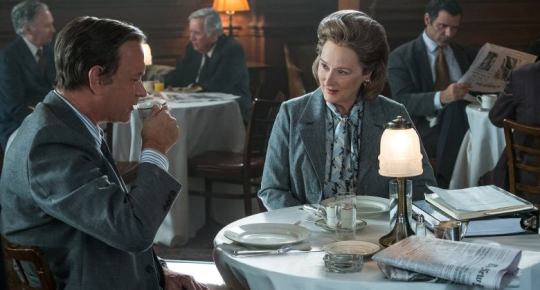
Calling The Post timely isn’t so much an opinion as it is a truism. The parallels between the deceptive presidencies of Nixon and Trump are so painfully obvious that the film couldn’t be timelier. Back in the Nixon era, the Vietnam War was the source of deception which led to the release of the Pentagon Papers detailing more than 20 years of admissions of the failing American war effort, contradicting previous information. The Post is the story of how some journalists decided to print this information, specifically Washington Post heiress and publisher Katherine Graham, Meryl Streep in an Oscar-worthy performance in which she masterfully and subtlety conveys the weight of responsibility on her shoulders regarding a decision with potentially disastrous consequences. Streep makes her anxiety increasingly palpable until it all comes to a head in a powerfully assertive speech. Tom Hanks is great as Post Editor-in-Chief, Ben Bradlee, who’s fairly aggressive about getting the big story and improving his reputation, though Hanks still lets us admire this gruff character for his fierce dedication to journalistic integrity. Also great are the countless TV actors from Bob Odenkirk to Sarah Paulson to, yes, David Cross. As usual, Spielberg does a workmanlike job on the film and adds that elegant, classic Hollywood sheen to the material. He avoids an abundance of exposition, keeps his focus on the human crisis of conscience and allows the proceedings to flow smoothly. This is a very important story about heroes who risked everything in the name of truth and freedom of the press.
#6. Lady Bird
Director: Greta Gerwig
Starring: Saoirse Ronan, Laurie Metcalf, Tracy Letts
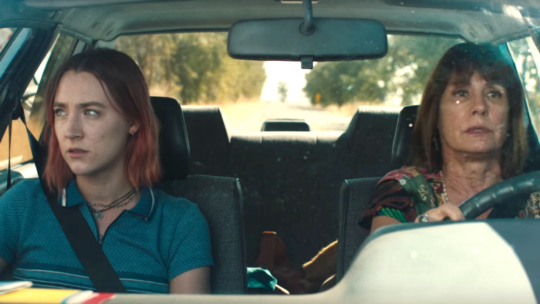
In her directorial debut film, Lady Bird, Greta Gerwig puts a fresh spin on the high school movie without relying on overly quirky characters, gimmickry or excess. Its breezy naturalism helps it transcend the genre with the stripped-down, straightforward and ordinary nature of the movie, paradoxically, making it so complex. A celebration of autonomy and liberation, Lady Bird follows the titular character (Saoirse Ronan) who feels trapped in a mundane life at an all-girls Catholic school in Sacramento with a mother (Laurie Metcalf) who’s mastered the art of passive aggression. But, Ronan turns Lady Bird’s normalcy into a thing of beauty and makes her an embodiment of perseverance in subtle ways. Metcalf is exceptional here too, often ruthless but always sympathetic as the overworked breadwinner of the family. But most of the praise should go to Gerwig, already a great actress and now directing with a gentle and pure touch, allowing the film to breath with little contrivance. She keeps her scenes brief and adds her unique observations and unorthodox comedic sensibilities to the dialogue which is authentic, witty and often shockingly hilarious. This is a smart and insightful film that’s all but devoid of flaws.
#5. Stronger
Director: David Gordon Green
Starring: Jake Gyllenhaal, Tatiana Maslany, Miranda Richardson

Once again, Jake Gyllenhaal has been snubbed by the Academy. In Stronger, he gives yet another magnificent performance playing Jeff Bauman, an underachieving Boston native who loses his legs during the Boston Marathon bombing while cheering on his ex-girlfriend, Erin (Tatiana Maslany), at the finish line. The movie recounts his rehabilitation as well as the accompanying emotional turmoil he and his family must endure. Movies like this have been done before but rarely with this much brutal honesty. Gyllenhaal is so convincing, making you feel his every ache and bruise; we’re heart broken just watching the poor man trying to enter his bathtub. He completely transforms in front of our eyes from an overeager and fun-loving young man to a bitter, often angry victim with impressive ease. Maslany is equally impressive, wrestling with a multitude of emotions from compassion to guilt to frustration to anger, often simultaneously, in this refreshing take on the ‘caring loved one’ role. In less competent hands, this would be a conventional TV movie full of cliches and sentiment. But David Gordon Green imbues his work with so much realism whether it’s the injury itself, the recovery process, the reactions from friends and family or Bauman’s mental state. It’s a truly inspirational film and meditation on heroism that actually respects its audience.
#4. Three Billboards Outside Ebbing, Missouri
Director: Martin McDonagh
Starring: Frances McDormand, Woody Harrelson, Sam Rockwell
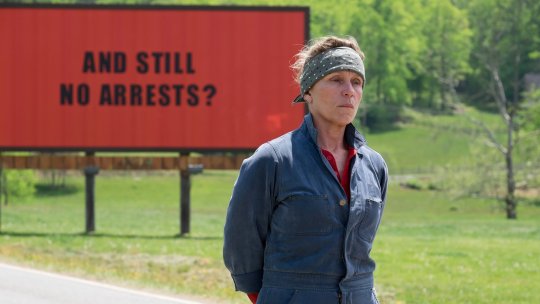
Not only is Three Billboards Outside Ebbing, Missouri timely, but it has one of last year’s most original premises. Enraged by the lack of progress made by the police in identifying the person who raped and murdered her teenage daughter, Mildred Hayes, played by the force of nature that is Frances McDormand, takes action by renting three billboards near her home in Ebbing and posting messages calling out the police for their lack of competence and urgency, especially Chief Willoughby (Woody Harrelson). Obviously, this starts a chaotic chain of events, crafted by writer/director Martin McDonagh, that deals with relevant social issues in a way that’s by turns tragic and shockingly hilarious. But, contrary to the marketing campaign, McDonagh’s film isn’t so black and white; he illustrates the complexity of the matter by exposing fault in all parties involved as well as the tragic consequences of their actions. McDormand shows us an utterly depleted woman with nothing but rage and a mission, making some of the most scathing remarks you’ll hear to anyone in her way, yet still able to sympathize when she sees her adversary in pain, like Willoughby who’s dying of cancer. Harrelson gives an incredibly poignant speech related to this that’s one of the films highlights. Sam Rockwell is also sensational as a racist scumbag of a cop who nonetheless embarks on a path of redemption. The ending is ambiguous. What happens is irrelevant. Whether you think Rockwell deserves redemption is also besides the point. What matters is that there’s a dialogue starting, progress being made and, indeed, something being done. In other words, there’s hope.
#3. The Disaster Artist
Director: James Franco
Starring: Dave Franco, James Franco, Seth Rogan
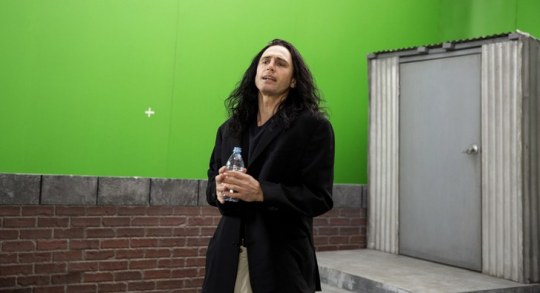
Apparently, James Franco might be a bad dude and shame on him if he is. But, I’m here to talk about movies and The Disaster Artist is a damn good one. Most of the credit should go to writers Scott Neustadter and Michael H. Weber, anyway, for crafting an insightful, hilarious, yet oddly touching screenplay about the wildly misguided Tommy Wiseau (James Franco) who was responsible for The Room, one of the worst movies ever made. We’re oriented by Dave Franco playing The Room star, Greg Sestero, from when he meets the awful but ambitious performer, Wiseau, in an acting class in the late ‘90s through the early ‘00s which sees the pair become friends, move to LA to act, fail miserably and decide to make their own movie. Dave Franco charms as the wide-eyed optimist who’s accepting to a fault. James Franco, still maybe an ass, is great as Wiseau, capturing his voice and mannerisms perfectly, giving us a character who’s as delusional and jealous as he is free-spirited, also to a fault. Their relationship is charming in the beginning and no less intriguing when its threatened by one’s pride and the other’s loss of confidence. The story’s at its best when Wiseau is filming his dream project and we see his lack of talent and leadership grate on cast and crew, specifically Seth Rogen as Sandy Schklair, whose exasperation is priceless. But the film makers are wise to tease without deriding and actually give some credit to Wiseau for, when you think about it, the man accomplished more than most of us ever will, illustrated in a film about a film that moves effortlessly from start to finish.
#2. Wind River
Director: Taylor Sheridan
Starring: Jeremy Renner, Elizabeth Olsen

If there’s any justice in this world, Taylor Sheridan soon will be swimming in awards and money for the man is responsible for the scripts of wonderful films like Sicario, Hell or High Water and now Wind River which he also directed. Few people are better at crafting profoundly entertaining commentaries on the dark and controversial pockets of America. With Wind River, he focuses on problems faced by those living on Indian reservations. The film seems like a recipe for a generic crime thriller starring Hawkeye and the Scarlett Witch until you remember Sheridan’s track record and the fact that Jeremy Renner and Elizabeth Olsen are actually great actors. After we’re shown a chilling prelude involving a teen girl running, and collapsing, in the snow in freezing temperatures without appropriate clothing, U.S. Fish and Wildlife Service agent Cory Lambert (Renner) finds the body and gets the narrative wheels in motion. Once rookie FBI agent Jane Banner (Olsen) arrives, they team up to solve the case that takes them to dark and twisted places. Sheridan let’s the film take its time to develop; it progresses clearly and logically, making it easy to follow along, unlike similar films. And unlike these films, you actually care as much about the people investigating the case as the case itself. Though used sparingly, Sheridan composes some of the most realistic and tense action sequences you’ll see. There’s one scene that’s almost unbearably intense but so utterly effective in making you feel the horror this community feels. It, like this film, gets under your skin and stays with you well after the credits roll.
#1. Call Me by Your Name
Director: Luca Guadagnino
Starring: Timothee Chalamet, Armie Hammer, Michael Stuhlbarg
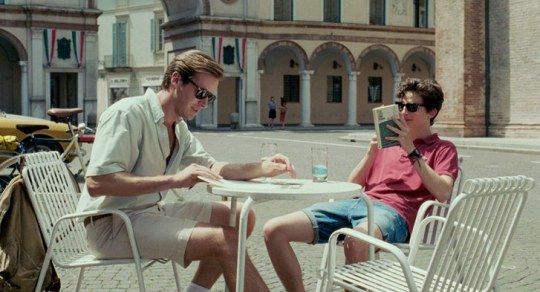
If you consider just how many love stories have been written in the history of humanity, you might think it impossible to create another great one. But what director Luca Guadagnino does with a script from James Ivory is pure bliss. Not only will you fall in love with the characters, but you’ll also fall in love with the gorgeous, picturesque northern Italian countryside on display. It’s here, during a lazy summer of 1983, where an introverted, music-loving Italian-American teen, Elio (Timothee Chalamet), meets an older, classically handsome and outgoing graduate student named Oliver (Armie Hammer), forming a relationship that will change their lives forever. Elio’s father (Michael Stuhlbarg), an archaeology professor, invites Oliver to live with them for the summer to help with his research and although Elio initially is turned off by this ‘intruder’, gradually he forms an attraction. How the film makers deal with this attraction and eventual relationship is simply perfection. The way in which the two characters subtly feel each other out at the start feels so true to life and each subsequent step from attraction to bonding to seduction is equally realistic and even more entertaining.The film benefits from the actors’ fearless performances, especially that of newcomer Chalamet who’s a ball of pent up sexual energy. The movie ends with Stuhlbarg having an irresistibly touching discussion with his son, full of warmth and understanding, and a final heartbreaking scene, so simple in concept yet so emotionally complex. Chalamet takes your breath away here with an array of emotions parading across his face as Sufjan Stevens’ gorgeous ‘Mystery of Love’ plays in its entirety. It’s one of the the most entrancing endings to a movie you’ll see, capping off the best film of 2017.
3 notes
·
View notes
Photo

ON SOCIAL MEDIA AND ALGORITHMIC IDENTITY / Rob Horning
According to the common story about our fall into postmodernity, being yourself has become hard work... → Once, people were born into relatively stable situations in which identity was prescribed based on where one was born and to whom. There was little choice in the matter of what sort of life one would lead, and little social or geographical mobility. The social categories (class, gender, ethnicity, religion) that determined the possibilities for one’s life were essentially fixed, as were the way those categories were defined. → But then industrialization and the advent of mass media scuttled those categories over time and rendered social norms more fluid and malleable.
Identity was no longer assigned but became a project for individuals to realize → It became an opportunity and a responsibility, a burden.
“You could now fail to become someone.”
Some sociologists and psychologists label this condition “ontological insecurity” → In The Divided Self, R.D. Laing defines it as when one lacks “the experience of his own temporal continuity” and does not have “an overriding sense of personal consistency or cohesiveness.”
Laing argues that without this stable sense of self, every interaction threatens to overwhelm the individual with the fear of losing oneself in the other or of being obliterated by their indifference.
A stable sense of self across time makes life meaningful; it allows us to experience and transmit a sense of “authenticity” → But this stable, authentic self tends to be represented as the means to its own end... → “You achieve a self by being yourself and finding yourself...” This tautology sets us up for failure, and for the endless labor of trying to express and realize ourselves.
“Depression began its ascent when the disciplinary model for behaviors, the rules of authority and observance of taboos that gave social classes as well as both sexes a specific destiny, broke against norms that invited us to undertake personal initiative by enjoining us to be ourselves … The depressed individual is unable to measure up; he is tired of having to become himself.”
Under economic conditions in which maximizing our “human capital” is paramount → we are under unremitting pressure to make the most of ourselves and our social connections and put it all on display to maintain our social viability. We are perpetually “unable to measure up”: we must, like any other capitalist firm, demonstrate an ability to maintain growth or become obsolete. The neoliberal demand that we convert our lives into capital and grow it systematically seizes on the ideal of self-expression and strips it of its dignity and allure.
This is the context in which social media have thrived → solve the problem of the self under neoliberalism, extending a platform for human capital development while still offering a seemingly stable basis for “ontological security.”
“It may seem that social media, by making social interaction asynchronous, shifting a portion of it online to an indefinite “virtual” space, and subjecting it all to constant monitoring, measurement, and assessment would not be a recipe for producing a sense of personal continuity. The way our self-expression gets ranked in likes and shares in social media would seem to subordinate identity to competition over metricized attention, dividing peers into winners and losers. And the creation of identity in the form of a data archive would seem to fashion not a grounded self but an always incomplete and inadequate double — a “self partially forced from the body.” You are always in danger of being confronted with your incohesiveness, with evidence of a past self now rejected or a misinterpreted, misprocessed version of one’s archive being distributed as the real you.”
If Laing is right about ontological insecurity, then social media seem designed to generate it → They systematically impose a sense of insubstantiality on users, turning identity into incoherence by constantly assimilating and demanding more data about us, making our self a vacuum that never fills, no matter how much is poured in → Our identity is constantly being recalibrated and recalculated, and we can forever try to “correct” it with more photos, more updates, more posts, more data...
But this same destabilization opens up the possibility for compensatory reassurances: the serial pleasures of checking for likes and other forms of micro-recognition made suddenly meaningful by the acute insecurity. Even as social media destabilize the lived experience of our self’s continuity, they address the dissolution of identity with a dynamic system of identity capture.
The profile → takes over for the old identity stabilizers (family, geography, religion, etc.) and becomes the sturdy blank slate on which various roles can be inscribed while we remain open to the saturation of as many different influences as possible. It can hold our lives while we are busy constantly reinventing ourselves for labor markets → Social media exacerbate ontological insecurity while masquerading as its cure.
“The algorithmic bubbles that social media construct around us are key part of the consolation the platforms provide. Their constant, reliable presence let us consume a sense of the ontological security the platforms are in the process of eroding. The filter bubble is not an unfortunate accident, as Mark Zuckerberg suggested in his “global community” manifesto, but an essential source of social media’s appeal: the aspect that allows it to counter postmodernist vertigo.”
If all the content on Facebook is tailored to suit the company’s construction of who we are, then consuming it is like consuming a coherent version of ourselves. It also reinforces the idea that the best place to glimpse your stable social identity is on Facebook. Engagement with social media then signals our assent to this algorithmic figuring of the self
Digital studies professor John Cheney-Lippold’s We Are Data → explores algorithmic identity, but not in terms of the subjective reassurance or pleasure it may provide. He is more concerned with the control algorithmic systems impose through the way data aggregators structure various social categories. He outlines the way social media companies, marketers, and state institutions use our data trails to calculate what our age, race, gender, class, nationality, and so on are likely to be, and how those probabilities are used to reshape our individuated realities. As more information about ourselves is captured within Big Data systems by phones, social media platforms, fitness trackers, facial recognition software, and other forms of surveillance, algorithms assign identity markers to us, place us in categories based on correlations to patterns drawn from massive data sets, regardless of whether these correspond to how we think of ourselves → We become, to an extent, what other people do, as their data contributes to how ours is interpreted. The system will infer our identity, according to categories it defines or invents, and use these to shape our environments and further guide our behavior, sharpen the way we have been classified, and make the data about us denser, deeper. As these positivist systems saturate social existence, they nullify the idea that there is something about identity that can’t be captured as data.
Frank Pasquale → “black-box scoring” in The Black Box Society
Data-driven identity systems → perpetuate the social significance of categories while removing the negotiation of what any category means from the social, interpersonal sphere, placing them instead in opaque, private systems
Unmappable to any pre-existing social category, these submerged, unseen identities in theory can be pushed into the social world and made reflexive there. In other words, the systems can invent races, and perpetuate the logic of racism: that it is “rational” to seek data patterns about populations and make them overt and socially salient, definitive for those so identified. On an individual level, bespoke discrimination by algorithm may make it impossible to know when and why one is being excluded or singled out
From the start, we are not self-inventing. We are born into a social context that forms the framework and the limitations of our self-knowledge. Knowing ourselves means understanding this immutable context that we didn’t choose.
Algorithms promise a simple solution to the riddle of the self, should we want one → They promise the certainty that data alone suffices to make a self: just generate data and you are significant, a somebody, a unique identification number at the very least → One can accept the ready pleasure of consumerism rather than pursue the freedom of autonomy, which is always imperfect and requires boundless innovation in our techniques of resistance. We can learn the secret of ourselves, as long as we consent to be controlled.
0 notes